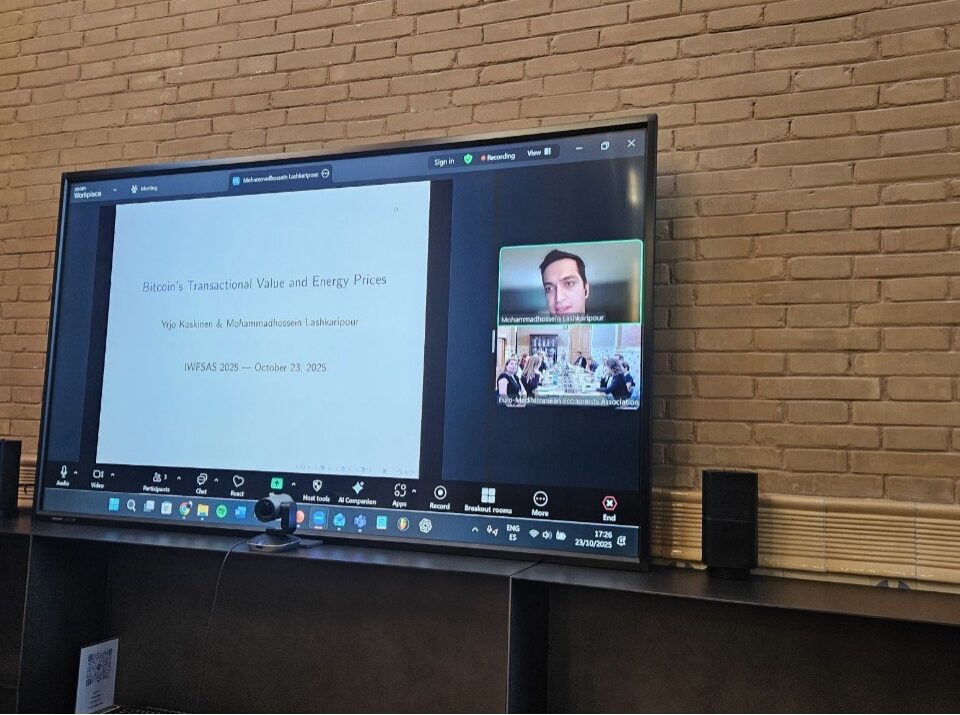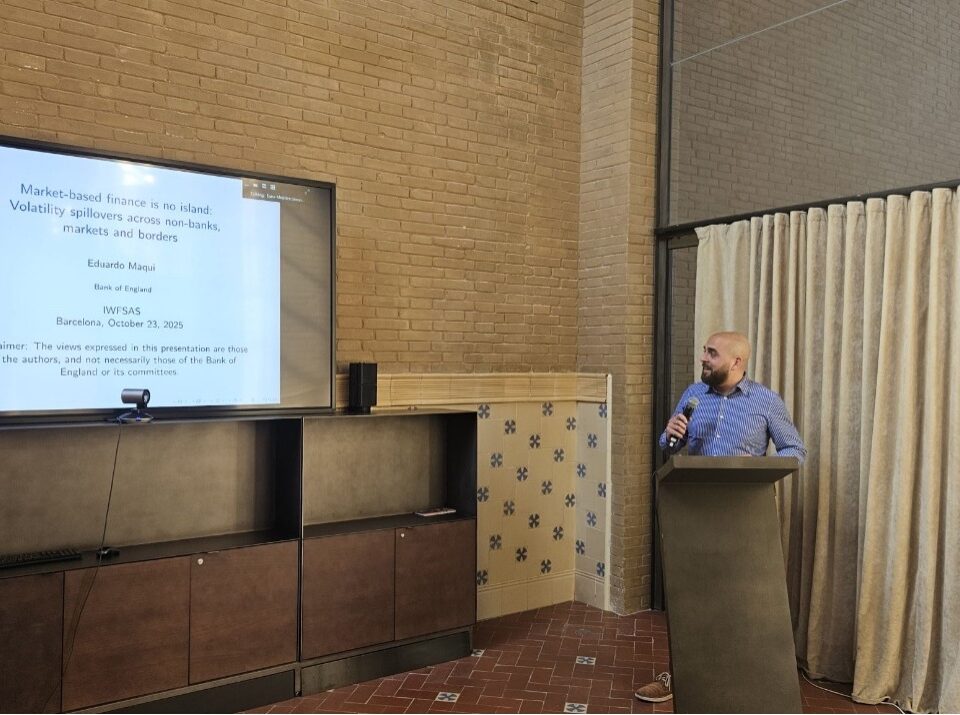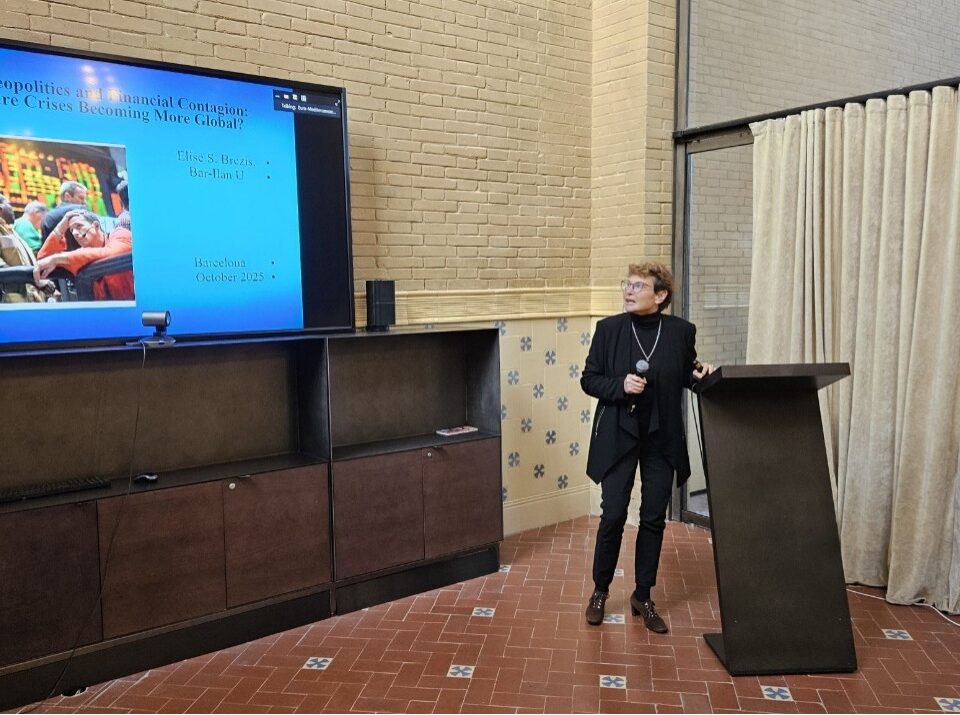IWFSAS 2025 Concluded with Great Success

The 10th Edition of the International Workshop on Financial System Architecture & Stability (IWFSAS) successfully concluded at the Euro-Mediterranean Economists Association (EMEA) Headquarters, Recinte Modernista de Sant Pau, Barcelona – 23–24 October 2025, bringing together leading academics, researchers, international economists, financial sector experts and policymakers to debate the future of the global financial architecture in a rapidly changing geopolitical and economic landscape.
IWFSAS 2025 was organised by the Euro-Mediterranean Economists Association (EMEA) in collaboration with the Centre for European Policy Studies (CEPS), Bayes Business School (City, University of London), and the Gustavson School of Business (University of Victoria).
The workshop received 33 paper submissions, of which 13 were presented, across four academic sessions addressing macro-financial stability, market-based finance, debt and monetary sovereignty, and the geopolitical restructuring of international financial flows. The programme also included two keynote speeches and a high-level policy session.
IWFSAS 2025 Day 1 – 23 October 2025
Opening Interventions


The first day opened with remarks by Prof. Barbara Casu Lukac, Director of the Centre for Banking Research & Deputy Dean (Faculty and Research), Bayes Business School and EMEA Advisor, and Dr. Cinzia Alcidi, Director of Research and Head of the Economic Policy Unit at CEPS and EMEA Advisor, who set the stage for two days of research-driven policy dialogue.
Keynote Speech

The keynote address of the first day was delivered by Kathleen Tyson, author of Multicurrency Mercantilism and Founder & CEO of Pacemaker.Global, who examined how geoeconomic fragmentation, digital infrastructures, and sanctions dynamics are reshaping the architecture of global finance.

Academic Session 1: “Financial Stability and the Real Economy” chaired by Dr. Sami Ben Naceur – Director, IMF Middle East Centre for Economics and Finance (CEF), Member of EMANES Scientific Committee.
Presented papers
Disentangling the Real Impact of a Credit Market Disruption
- Author: Cédric Huylebroek (KU Leuven & Norges Bank)
- Discussant: Francesc Rodriguez Tous (Bayes Business School)
Monetary Policy and Long-Term Real Rates: Revisiting the Evidence
- Author: Francesc Rodriguez Tous (Bayes Business School)
- Discussant: Dr. Yeganeh Forouheshfar (EMEA)
Heterogeneous Macroprudential Policies and Corporate Financing Decisions
- Author: Yassine Bakkar (Queen’s University Belfast)
- Discussant: Cédric Huylebroek (KU Leuven & Norges Bank)

Academic Session 2: “Financial Stability and Market-Based Finance” chaired by Dr. Yeganeh Forouheshfar, Senior Researcher, EMEA.
Presented papers
Certification vs. Conflicts of Interest in Banking: The Case of ABS
- Author: Dr. Angela Gallo (Bayes Business School)
- Discussant: Eduardo Maqui (Bank of England)
Market-Based Finance Is No Island: Volatility Spillovers Across Non-Banks, Markets and Borders
- Author: Eduardo Maqui (Bank of England)
- Discussant: Farah Mugrabi (Université Catholique de Louvain & Central Bank of Ireland)
Systemic Implications of Financial Inclusion
- Author: Farah Mugrabi (Université Catholique de Louvain & Central Bank of Ireland)
- Discussant: Dr. Angela Gallo (Bayes Business School)

Academic Session 3: “Debt” chaired by Ms. Yara Saab, Director, EMEA.
Presented papers
The Chicago Plan Revisited – Debt-Free Money, Growth, and Stability
- Author: Michael Kumhof (Bank of England)
- Discussant: Gonçalo Pina (ESCP Business School)
The State-Contingent Debt Premium: Evidence from French Public Bonds
- Author: Gonçalo Pina (ESCP Business School)
- Discussant: Yassine Bakkar (Queen’s University Belfast)
Bitcoin’s Transactional Value and Energy Prices
- Authors: Yrjö Koskinen & Mohammadhossein Lashkaripour (University of Calgary)
- Discussant: Ivan Russo, University of Università degli Studi di Milano-Bicocca
Day 1 – Closing Reflections
Closing the first day of IWFSAS 2025, Prof. Rym Ayadi, President and Founder of EMEA, underlined: “We welcomed the 10th Edition of IWFSAS in Barcelona to share the latest research and policy on the evolving architecture of the global financial system — a system facing profound transformation driven by technological innovation, climate imperatives, geopolitical shifts, and the search for resilience, looking beyond efficiency.”

Day 2 – 24 October 2025
The second day opened with the continuation of the academic programme, followed by a keynote speech and the flagship policy session.
Academic Session 4: “Geopolitics and Financial Stability” chaired by Prof. Barbara Casu Lukac, Director of the Centre for Banking Research & Deputy Dean (Faculty and Research), Bayes Business School, and EMEA Advisor.

Presented papers
Climate Change Risk-Related Engagement and Credit Risk in the South African Banking System
- Authors: Ivan Russo, University of Università degli Studi di Milano-Bicocca
- Discussant: Ivan Hajdukovic, EMEA Research Fellow
Geopolitics and Financial Contagion: Are Crises Becoming More Global?
- Author: Elise Brezis, Bar-Ilan University – Head of the Azrieli Center for Economic Policy and the Israel Macroeconomic Forum
- Discussant: Karim Iddouch, PhD International University of Casablanca
Geopolitical Risk, Global Banking, and the Role of Financial Architecture, Institutions and Regional Integration
- Author: Karim Iddouch, PhD International University of Casablanca & Sara Loukili, Banque Al Maghreb
- Discussant: Beatrice Mbinya, University of Nairobi & African Organization on Debt and Development
Geopolitical Fragmentation and De-dollarization: Quantifying Systemic Financial Instability through Multi-Asset Reallocation and Contagion
- Author: Beatrice Mbinya, University of Nairobi & African Organization on Debt and Development
- Discussant: Elise Brezis, Bar-Ilan University – Head of the Azrieli Center for Economic Policy and the Israel Macroeconomic Forum
Keynote Speech
 The keynote speech of the second day was delivered by Prof. Ulrich Bindseil, TU Berlin and former Director General at the European Central Bank (ECB), on “Monetary Sovereignty – Responding to the New Challenges”, exploring how technological change, new financial infrastructures, and geopolitical realignment are reshaping monetary sovereignty and currency hierarchies.
The keynote speech of the second day was delivered by Prof. Ulrich Bindseil, TU Berlin and former Director General at the European Central Bank (ECB), on “Monetary Sovereignty – Responding to the New Challenges”, exploring how technological change, new financial infrastructures, and geopolitical realignment are reshaping monetary sovereignty and currency hierarchies.
Policy Session: “Rethinking Global Finance”

Moderator: Prof. Rym Ayadi, Founder and President, EMEA
Introduction: Karel Lannoo, CEO, CEPS
Panelists:
- Kathleen Tyson, Founder & CEO, Pacemaker.Global
- Prof. Ulrich Bindseil, TU Berlin; former Director General, ECB
- Martin Kessler, Director, Finance for Development Lab, Paris
- Katie Gallogly Swan, UNCTAD
- Prof. Dr. Martin R. Stuchtey, Founder, The Landbanking Group
The session explored how the international financial system must be redesigned to deliver resilience, inclusion and sustainability, with particular attention to governance reform, fairer access to capital for the Global South, and the mobilisation of long-term investment for climate and sustainable development.
Final Closing Remarks

Closing the 10th Edition of IWFSAS, Prof. Rym Ayadi emphasised: “The future of global finance will not be built on a new hegemon, but on a cooperative dynamic infrastructure — a multipolar, technologically enabled system where Europe and the Global South reclaim financial sovereignty from the dominant currency.”
Warm thanks are extended to all speakers, session chairs, discussants, authors, contributors and participants for their engagement and high-level contributions. IWFSAS continues to serve as a bridge between academic research and financial policy innovation, reinforcing EMEA’s commitment to advancing a more resilient, inclusive and sustainable global financial architecture. We look forward to continuing this dialogue in IWFSAS 2026.

More photos from the event














